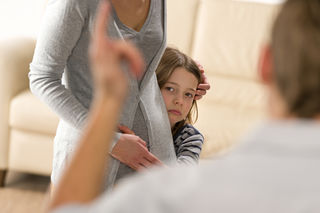Relationships
Why Family Hurt Is So Painful
Four reasons why family hurt can be more painful than hurt from others.
Posted March 27, 2017 Reviewed by Ekua Hagan

Not only does it feel especially painful when our family members hurt us, it actually is more painful than when friends hurt us. According to Anita Vangelisti, a professor of communication at the University of Texas at Austin, hurt is a feeling of emotional injury which can be caused by communication. Family hurt is especially painful for a few reasons.
1. We hold cultural beliefs that our family members will be there for us unconditionally. This makes us feel, for better or worse, that we are tied to one another involuntarily. When someone you are so committed to says or does something to hurt you, it is perceived as worse than when someone you are less committed to does the same thing.
2. Shared history gives our siblings an unending supply of embarrassing childhood moments to use for making fun of us. Lighthearted teasing can quickly cross a line into hurtful communication.
3. Family members tend to depend on each other for support, advice, and money, among other things. We also tend to be emotionally invested in one another, making hurt more painful than in less emotionally dependent relationships.
4. We tend to distance ourselves less from family members when they hurt us compared to our friends. A few years ago my brother was supposed to pick me up from the airport after a week-long conference. He had been staying at my house watching my dogs. He was two hours late to the airport, and because it was a late flight, this meant I was standing outside of security until 2 a.m. waiting for him. When I got home, I found that he had rearranged my furniture, and that the window on my car (which I let him borrow for the week) was no longer working. If a friend did this, I would seriously question our continued relationship; I would definitely never ask them to house-sit or pick me up from the airport again. But because it was my brother, I had all but forgotten about it by the next week.
Vangelisti and her colleagues identified some common aspects of hurtful family environments:
- Aggression is typified by behaviors such as belittling, dominating, and insulting communication; criticism, lying, arguing, and controlling; ganging up on family members; and stress.
- Lack of affection is the absence of verbal affirmations of love, physical affection, encouragement, and time spent together.
- Neglect includes ignoring or not paying attention to one another and not feeling comfortable around some family members.
- Violence encompasses physical harm and sexual abuse.
Vangelisti’s study found that people who experienced these types of environments were the most dissatisfied with their family relationships.
Recent research takes family hurt and distancing to another level. Kristina M. Scharp* (a research professor and a colleague here at Utah State University) and I have new research out this month in the Annals of the Interpersonal Communication Association describing how family distancing works in regard to the “black sheep” of the family and family estrangement, two chronically stressful outcomes that are fairly common in the U.S.
We advocate that, sometimes, distancing is a healthy solution to toxic family relationships marked by abuse and neglect. Family members who are able to sustain distance from one another are frequently questioned about their family status and encouraged by others to mend their relationships, even if those relationships are unhealthy. This painful questioning is likely driven by societal beliefs about the importance of family and the idea that families are "forever."
*Scharp and I direct the Family Communication and Relationships Lab, a collaborative group of social scientists focused on understanding challenging family relationships such as these.
References
Scharp, K. M. & Dorrance Hall, E. (2017). Family marginalization, alienation, and estrangement: Questioning the nonvoluntary status of family relationships. Annals of the International Communication Association, 41, 28-45. doi: 10.1080/23808985.2017.1285680
Vangelisti, A. L., & Crumley, L. P. (1998). Reactions to messages that hurt: The influence of relational contexts. Communications Monographs, 65, 173-196. doi: 10.1080/03637759809376447
Vangelisti, A. L. & Hampel, A. D. (2010). Hurtful communication: Current research and future directions. In S. W. Smith & S. R. Wilson (Eds.), New directions in interpersonal research (pp. 221-241). Thousand Oaks, CA: Sage.
Vangelisti, A. L., Maguire, K. C., Alexander, A. L., & Clark, G. (2007). Hurtful family environments: Links with individual, relationship, and perceptual variables. Communication Monographs, 74, 357-385. doi: 10.1080/03637750701543477


